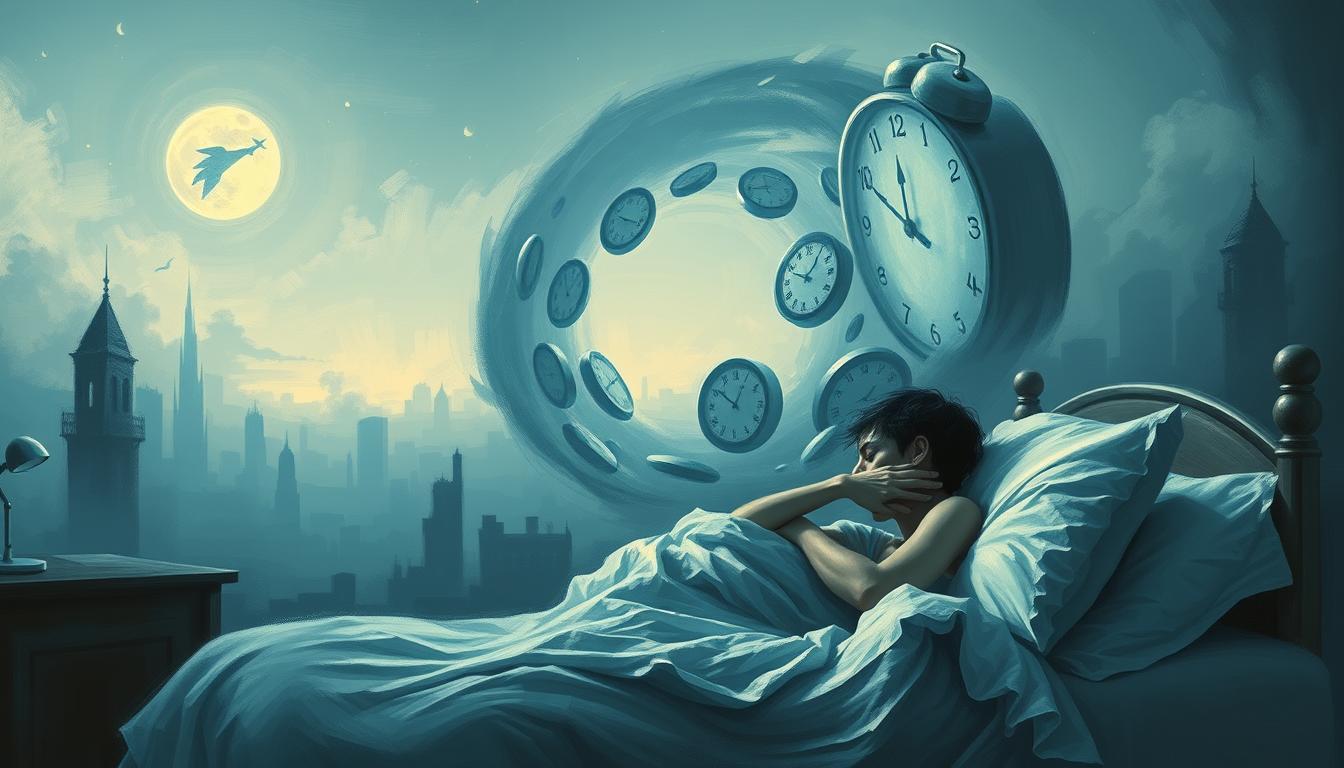Millions of Americans face sleep issues that impact their daily lives. Sleep disorders and circadian dysfunction are common in our fast-paced world. These conditions often lead to poor sleep quality.
Your body has a natural sleep-wake cycle. When this cycle is disrupted, sleep problems can arise. Sleep deprivation affects both physical and mental health.
Sleep disorders and circadian dysfunction create health challenges. Poor sleep can cause mood swings, memory issues, and a weak immune system. Many people don’t know how these issues affect their well-being.
Understanding these conditions is key to better sleep. Sleep deprivation doesn’t have to control your life. Treatments and lifestyle changes can help restore healthy sleep patterns and improve your life quality.
What Are Sleep Disorders?
Many people face sleep issues, but sleep disorders are more than just occasional trouble sleeping. They are real medical conditions that disrupt your sleep patterns and health. These disorders make it hard to fall asleep, stay asleep, or get good sleep.
Unlike short-term sleep issues, sleep disorders last a long time and need a doctor’s help. They can affect how you feel and function every day. Knowing about these conditions helps you see when you need medical help for sleep problems.
Types of Sleep Disorders
There are over 80 types of sleep disorders, each with its own symptoms and treatments. The main categories are sleep-wake disorders, breathing-related sleep disorders, and neurological sleep conditions.
Insomnia is the most common sleep disorder, affecting about 30% of adults at some point. It makes it hard to fall asleep, stay asleep, or wake up too early. People with insomnia often feel tired during the day, even after sleeping enough.
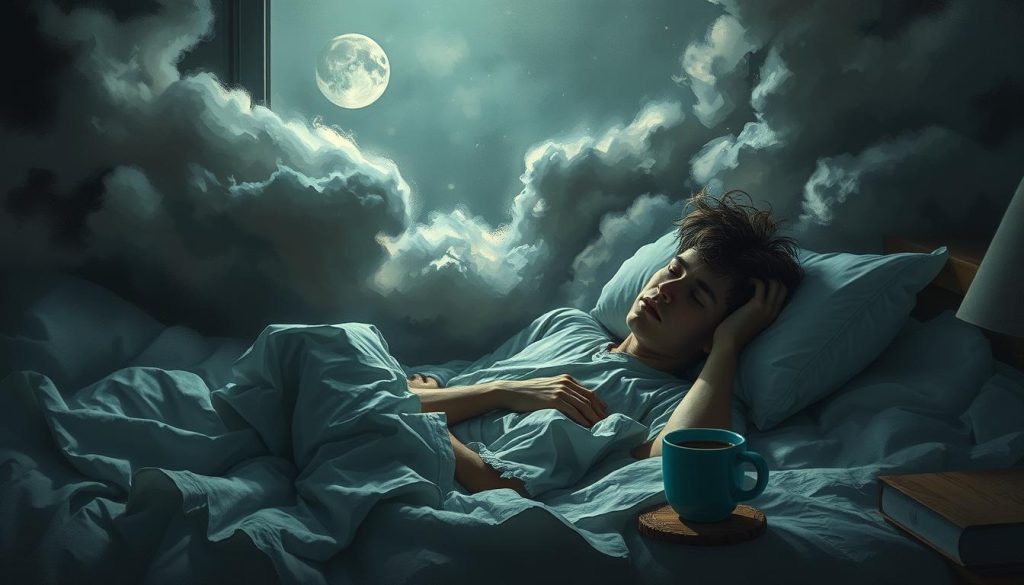
Sleep apnea is a serious breathing disorder that causes breathing stops during sleep. It affects millions of Americans and can cause serious health problems if not treated. The most common type, obstructive sleep apnea, happens when throat muscles relax and block the airway.
Narcolepsy is a brain disorder that messes up sleep-wake cycles. People with narcolepsy feel very sleepy during the day and may fall asleep suddenly. They also might have muscle weakness when they’re upset.
Symptoms and Signs
Spotting sleep disorder symptoms early can help with treatment. Common signs include trouble falling asleep within 30 minutes of bedtime. Many also wake up a lot at night and can’t fall back asleep.
Daytime symptoms can also hint at sleep disorders. Feeling very tired, having trouble concentrating, and mood changes are common signs. Some people get irritable, have memory problems, or do worse at work.
Physical signs can also point to sleep disorders. Loud snoring, gasping during sleep, or breathing stops during sleep might mean sleep apnea. Morning headaches, dry mouth when you wake up, and restless legs are other signs that need a doctor’s check.
Causes and Risk Factors
Sleep disorders come from many factors that disrupt sleep. Medical conditions like heart disease, diabetes, and brain disorders can cause sleep problems. Some medicines can also mess with sleep.
Lifestyle choices play a big role in sleep disorders. Irregular sleep times, too much caffeine, and not enough exercise can lead to sleep issues. Working shifts or traveling across time zones can also affect sleep.
Age and genetics also play a part. Older people’s sleep patterns change, making them more likely to have sleep disorders. Family history of sleep disorders, like narcolepsy and sleep apnea, suggests a genetic link.
Things in your bedroom can also affect sleep. Too much noise, uncomfortable temperatures, or light can disrupt sleep. Stress from work, relationships, or big life changes can also make sleep disorders worse.
The Role of Circadian Rhythms
The human body has complex biological clocks that control daily functions. These clocks work all day to keep you healthy. Knowing how they work helps us see why sleep issues can harm us.
Your circadian rhythms are like a conductor in an orchestra. They manage hormone release and body temperature changes. When they’re off, it affects your whole body.
What Are Circadian Rhythms?
Circadian rhythms are your body’s 24-hour cycles that respond to light and dark. They evolved to keep us in sync with nature. Your brain has a master clock called the suprachiasmatic nucleus that controls these rhythms.
Light exposure is key to setting your internal clock. Sunlight tells your brain to stay awake. As it gets dark, your body makes melatonin to help you sleep.
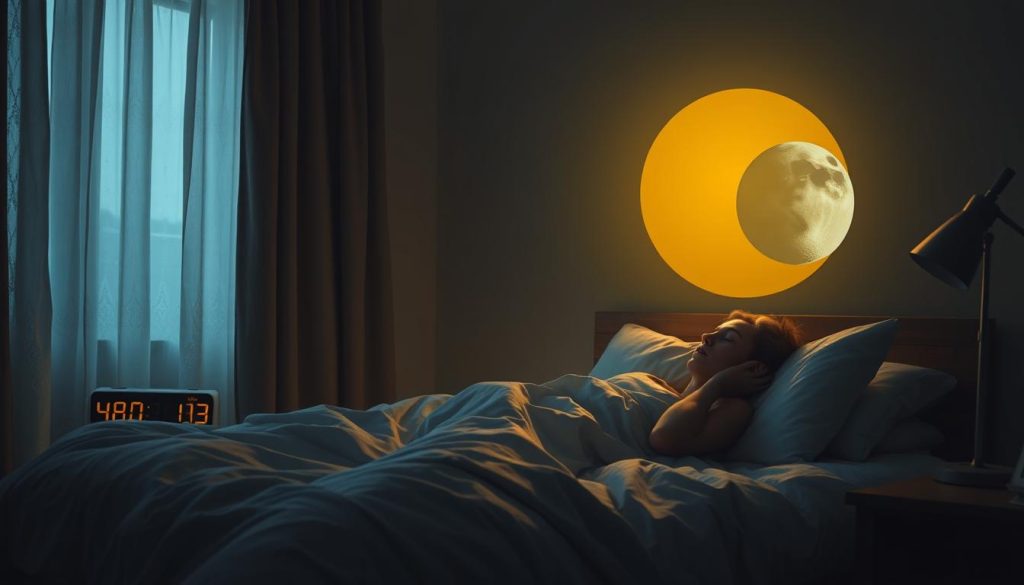
Circadian rhythm disruption happens when your internal clocks get out of sync. Modern life often messes with these natural patterns. Artificial light, irregular schedules, and jet lag can all mess with your timing.
A melatonin imbalance often comes from disrupted circadian rhythms. This hormone helps you sleep. When your rhythms are off, melatonin production can be wrong or missing.
Importance of Circadian Rhythms for Health
Healthy circadian rhythms help your immune system fight off infections. Your body produces immune cells at specific times. When these rhythms are off, your immune system weakens.
Your metabolism also depends on circadian timing. Hormones that control hunger and blood sugar follow daily patterns. Disrupted rhythms can lead to weight gain and diabetes risk.
Mental health also relies on stable circadian rhythms. These rhythms help regulate mood-controlling chemicals in your brain. People with disrupted rhythms often feel depressed, anxious, and have trouble concentrating.
Sleep quality improves when your circadian rhythms work right. Your body naturally gets ready for sleep by lowering temperature and releasing melatonin. This helps you fall asleep faster and sleep better.
Cognitive performance peaks at certain times of day thanks to circadian rhythms. Most people think best in the morning when cortisol levels are high. Knowing your rhythm patterns can help you schedule tasks better.
Common Sleep Disorders Related to Circadian Dysfunction
Circadian dysfunction is the main cause of many sleep disorders in the U.S. These issues aren’t due to bad habits. They are real medical problems with biological roots that need understanding and treatment.
When your internal clock doesn’t match your daily life, several disorders can occur. These disorders are more than just feeling tired. Let’s look at the most common sleep disorders linked to circadian rhythm problems.
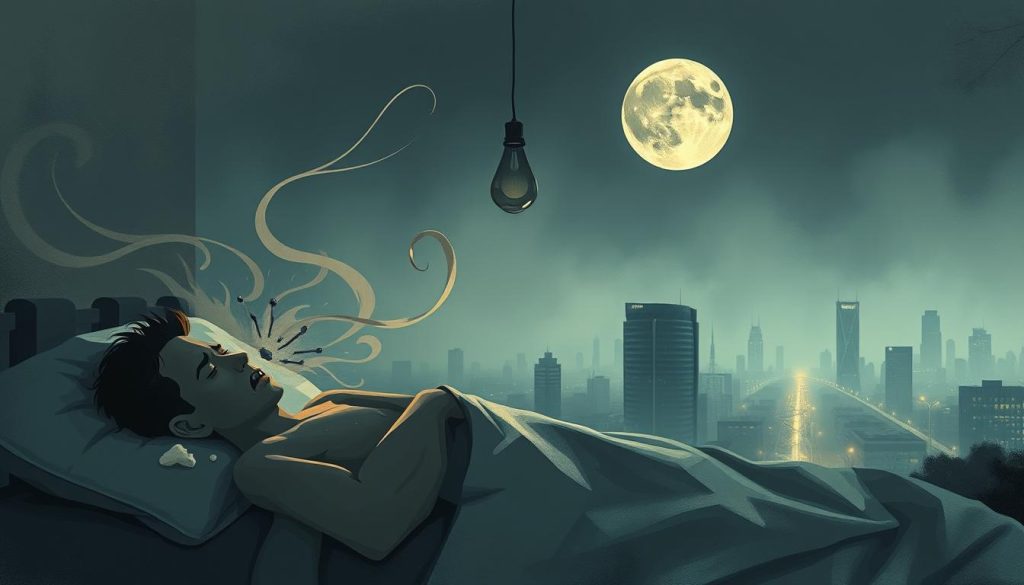
Sleep-Onset and Maintenance Problems
Insomnia is the most common sleep disorder tied to circadian issues. It makes it hard to fall asleep or stay asleep. Your body’s sleep drive relies on the right circadian timing.
Disrupted circadian rhythms confuse your brain about when to sleep or be awake. This leads to feeling tired during the day but awake at night. Many with insomnia also have restless leg syndrome, which gets worse in the evening.
Insomnia and circadian dysfunction show why traditional sleep advice often fails. Just going to bed early won’t work if your internal clock isn’t ready.
Natural Night Owl Tendencies
Delayed Sleep Phase Disorder affects those whose circadian rhythms are later than usual. It’s common in teens and young adults. Their bodies naturally want to sleep from 2 AM to 10 AM, not the usual 10 PM to 6 AM.
Those with this disorder aren’t lazy or undisciplined. Their biological clocks are just different. They’re most alert late at night and struggle with early mornings. This mismatch leads to sleep debt and daytime tiredness.
Work Schedule Conflicts
Shift Work Disorder occurs when jobs require working during natural sleep hours. Healthcare workers, security guards, and factory employees often face this. Their bodies still follow daylight patterns, even when they need to be alert at night.
This disorder is more than just job stress. Workers face chronic sleep issues, poor cognitive performance, and health risks. The 24/7 nature of today’s world makes this disorder more common, affecting both workers and workplace safety.
Understanding these disorders shows why simple solutions don’t always work. Each condition needs specific approaches that respect your body’s natural rhythms.
Diagnosis and Treatment Options
If sleep problems last even after trying everything, it’s time to see a professional. They can help you get back to healthy sleep. Managing sleep disorders and circadian dysfunction needs a mix of medical help and therapy.
When self-help doesn’t work, it’s time to get help from a doctor. Sleep issues can affect your daily life, work, and overall happiness.
Seeking Professional Help
A sleep specialist can help you find the cause of your sleep problems. They use special tools to diagnose and create a treatment plan just for you.
At your first visit, your doctor will ask about your sleep history and symptoms. They might do several tests:
- Sleep studies (polysomnography) to monitor brain waves, breathing, and movement during sleep
- Actigraphy testing to track sleep-wake patterns over several weeks
- Sleep diary analysis to identify behavioral patterns and triggers
- Blood tests to check hormone levels and rule out underlying conditions
- Circadian rhythm assessments using light exposure measurements
Many sleep centers offer overnight studies in a hotel-like setting. These studies give important information about your sleep.
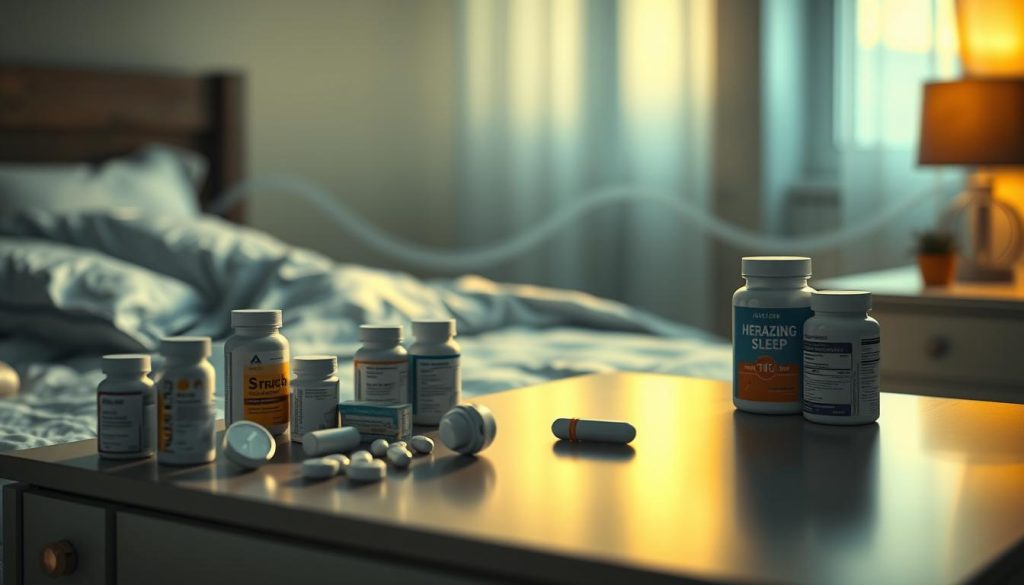
Behavior Modification Strategies
Cognitive Behavioral Therapy for Insomnia (CBT-I) is a top treatment for sleep problems. It helps change thoughts and behaviors that affect sleep.
CBT-I includes several steps to improve sleep:
- Sleep restriction therapy to consolidate sleep time
- Stimulus control techniques to strengthen the bed-sleep association
- Relaxation training to reduce bedtime anxiety
- Cognitive restructuring to address sleep-related worries
- Sleep hygiene education for optimal sleep environment
Light therapy is also effective for circadian rhythm disorders. It helps set your internal clock right.
Morning light therapy is great for delayed sleep phase disorder. Patients use light boxes for 30 minutes in the morning.
Medications and Therapies
Behavioral treatments are the base, but medications can help too. They should be part of a complete treatment plan.
Melatonin helps regulate your body’s clock. It’s good for jet lag, shift work sleep disorder, and more.
Doctors might prescribe sleep medications for short-term use. They consider options like zolpidem, eszopiclone, or ramelteon based on your needs.
Other therapies like acupuncture, massage, and mindfulness meditation can also help. They work alongside traditional treatments to offer more relief.
Working with healthcare professionals ensures you get a treatment plan that fits you. Regular check-ups help adjust the treatment and track your progress.
Tips for Better Sleep Hygiene
Good sleep hygiene is key for healthy sleep and a good circadian rhythm. Simple habits can greatly improve your sleep and well-being.
Building Consistent Sleep Patterns
Choose a fixed bedtime and wake-up time every day, even on weekends. Your body loves routine. It helps your sleep-wake cycle get stronger. Pick times that you can keep up with for a long time.
Optimizing Your Sleep Space
Make your bedroom cool, dark, and quiet. The best temperature is between 60-67°F. Use blackout curtains or an eye mask to block light.
Earplugs or a white noise machine can help if it’s too loud.
Managing Evening Activities
Stop using phones, tablets, and computers at least an hour before bed. Blue light from screens can make your brain think it’s still daytime. Avoid caffeine after 2 PM and big meals three hours before bed.
Starting with one or two changes can help. Small steps can lead to better sleep and a healthier circadian rhythm.

